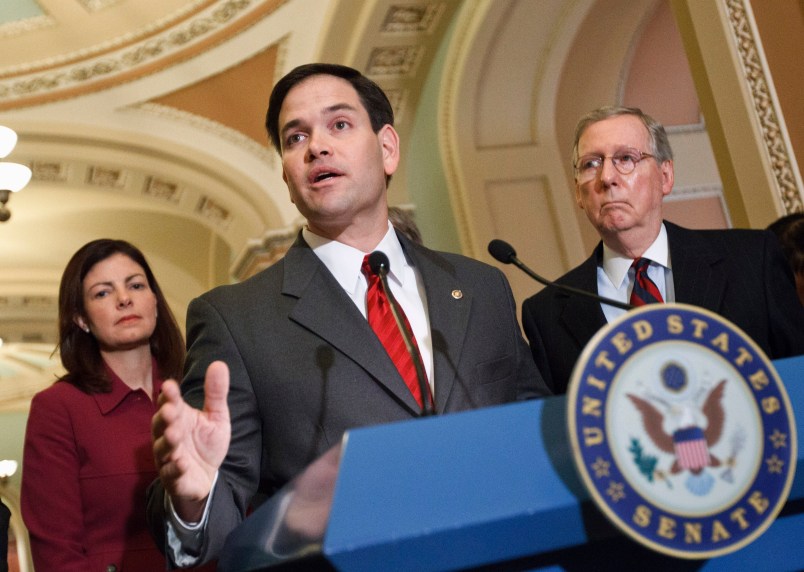Conservative wonks and Republican lawmakers are coalescing around a new strategy to sabotage Obamacare by repealing a temporary piece of the law designed to hold down premiums in the event of major market disruptions.
The provision — called “risk corridors,” but dubbed the “Obamacare bailout” by the law’s opponents — seeks to stabilize costs by creating a pot of money that takes in funds from insurers who enroll healthier customers and uses it to pay out insurers who enroll sicker customers. It’s a safety valve that sunsets after 2016. The repeal push is clever messaging in a sense because it lets conservatives snatch the mantle of populism from liberals against wealthy insurance companies. But it comes with its share of dangers, too.
Last November, as TPM reported, Sen. Marco Rubio (R-FL) introduced legislation to repeal this provision. Since then it has picked up 13 Republican co-sponsors, including Senate Minority Leader Mitch McConnell, and spawned two companion bills in the House, which are supported by numerous Republicans. The idea has been championed by conservative lobbying groups like the Club For Growth and Heritage Action, and pushed by writers including Charles Krauthammer in the Washington Post, Ramesh Punnuru in Bloomberg View and Deroy Murdock in National Review.
The conservatives are open about the end goal: collapse Obamacare by causing higher premiums on the law’s marketplaces for the newly insured, which progressive experts who support Obamacare agree may occur if the provision is scrapped.
Ponnuru, labeling the risk corridors “outrageous,” writes that without them insurance companies “would have to raise premiums and thus make their plans even more unattractive than they already are — or just withdraw from the exchanges. Obamacare would, in other words, become even less likely to succeed than it already is.”
Here’s the catch: the risk corridors aren’t required to be deficit-neutral so taxpayers may in fact be on the hook if the overall pool of people on Obamacare’s individual and small-group markets are sicker than expected. Hence labeling the measure a “bailout.” The provision could be utilized if the percentage of young people enrolled on the exchanges continues to come in under projections. (A similar provision was included in Medicare Part D, the prescription drug benefit enacted in 2003, without controversy.)
“Obamacare is a Rube Goldberg machine with hundreds of moving parts,” writes Krauthammer. “Without viable insurance companies doing the work, it falls apart. No bailout, no Obamacare.” He talked up the repeal bill’s strength as a political weapon: “Such a bill would be overwhelmingly popular because Americans hate fat-cat bailouts of any kind. Why should their tax dollars be spent not only saving giant insurers but also rescuing this unworkable, unbalanced, unstable, unpopular money-pit of a health-care scheme?”
It’s not clear how hard Republicans will push the issue. A House GOP leadership aide said a bill to repeal the risk corridors may come up, but isn’t planned yet. “Nothing is planned at this point, but I certainly wouldn’t rule it out,” said the aide, who wasn’t authorized to speak on the record.
Senate Democratic leaders, by contrast, have no desire to bring the legislation up for a vote. “It’s not something [Senate Majority Leader Harry] Reid would ever bring up, but if Republicans unite behind it there’s always a chance that they can force a vote,” said a Senate Democratic leadership aide.
But the Democratic aide, who was granted anonymously to candidly discuss strategy, doubted that Republicans would demand a vote. “It’s too clever by half — the name is catchy but it’s really just a vote to hike premiums and Democrats would have an easy time painting Republicans with that brush if they voted for it,” the aide said.
From a political standpoint, there are two sides to the coin: insurers have a sordid reputation, which means the GOP’s anti-bailout cause may indeed gain traction with voters. On the other hand, if Republicans charge ahead with their effort, Democrats could accuse them of seeking to raise health care costs and insurance companies, which strongly support the risk corridors, could express their disapproval by donating less to the GOP.
Interestingly, the anti-bailout effort has alienated even some staunch opponents of Obamacare. In a Forbes blog post warning that the GOP’s effort could “backfire,” Grace-Marie Turner of the industry-affiliated Galen Institute warns that if a bill to repeal the risk corridors becomes law, “Republicans could be blamed for causing premiums to be even higher than they will be next year.”






